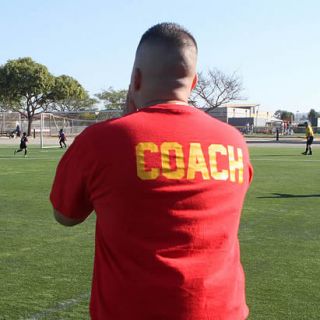Sport and Competition
How to Be a Winner
The part of the game every athlete can control
Posted February 19, 2014

John Wooden was a winner, and so were the UCLA Bruins who played for him. During a 12-year period from 1963 through 1975, his teams won 10 NCAA basketball championships. To accomplish this legendary feat, you might think Wooden had to be single-mindedly focused on winning games. And yet, where he was concerned, this wasn’t the case. In fact, what he did communicate to his teams may be the key to their success and their ability to play well under pressure.
Coach Wooden once told an audience of coaches:
You cannot find a player who ever played for me at UCLA that can tell you that he ever heard me mention “winning” a basketball game. He might say I inferred a little here and there, but I never mentioned winning. Yet the last thing that I told my players just prior to tip-off, before we would go on the floor, was, “When the game is over, I want your head up, and I know of only one way for your head to be up. That's for you to know that you did your best. No one can do more. . . . You made that effort.”
Relative to winning, Coach Wooden’s record speaks for itself. Yet it’s interesting to note that he placed an emphasis on the process of striving for excellence. His vision went beyond a preoccupation with winning games. Instead, the “Wizard of Westwood” demanded that his players dedicate themselves to 100 percent effort.
What should young athletes be taught about winning?
In terms of the educational benefits of sports, children can learn from both winning and losing. But for this to occur, winning must be placed in a healthy perspective. My colleague, Dr. Ron Smith, and I have therefore developed a four-part philosophy of winning—an orientation that’s designed to maximize athletes' enjoyment of sports and their chances of receiving the positive outcomes of participation.
1. Winning isn't everything, nor is it the only thing.
Young athletes can't possibly learn from winning and losing if they think the only objective is to beat their opponents. Does this mean that children should not try to win? Definitely not! As a form of competition, sports involve contests between opposing individuals or teams. It would be naive and unrealistic to believe that winning isn’t an important goal. But it isn’t the most important objective.
“The bottom line in youth sports should not be based on pressure to win. Instead, it should be on the enjoyment of competing and the opportunity to develop positive attitudes toward other people.” – Lute Olson, Basketball Hall of Fame coach
2. Failure isn’t the same thing as losing.
Athletes shouldn’t view losing as a sign of failure or as a threat to their personal value. They should be taught that losing a game isn’t a reflection of their own self-worth. In other words, when an individual or team loses a competition, it doesn’t mean they’re worth less than if they had won. In fact, some valuable lessons can be learned from losing. Children can learn to persist in the face of obstacles and to support each other, even when they don’t achieve victory.
3. Success isn’t equivalent to winning.
Thus, neither success nor failure need depend on the outcome of a contest or on a won-lost record. Winning and losing apply to the outcome of a game, whereas success and failure do not. How, then, can we define success in sports?
4. Athletes should be taught that success is found in striving for victory. The important idea is that success is related to commitment and effort!
Effort is within athletes’ zone of control. They have complete control over the amount of effort they give, but only limited control over the outcome that’s achieved.
“I have no control over results. All I can do is play to the best of my abilities. Success is me giving everything that I have.” – Ichiro Suzuki, Major League Baseball player
Repeatedly tell children that they’re never “losers,” if they commit themselves to doing their best and giving maximum effort. When you do this, you’re delivering a priceless gift that will assist them in many of life's tasks.
“Doing your best is more important than being the best.” – Forest “Frosty” Westering, College Football Hall of Fame coach
When winning is kept in a healthy perspective, the child comes first and winning is second. In this case, the most important sport product isn’t a won-lost record; it’s the quality of the experience provided for the athletes.
How can you teach an effort-oriented philosophy of winning?
The philosophy presented above is the core of our scientifically-validated coach and parent training programs. The Mastery Approach to Coaching and Mastery Approach to Parenting in Sports emphasize skill development, achieving personal and team success, giving maximum effort, and having fun. To access the videos, go to the Youth Enrichment in Sports website.




